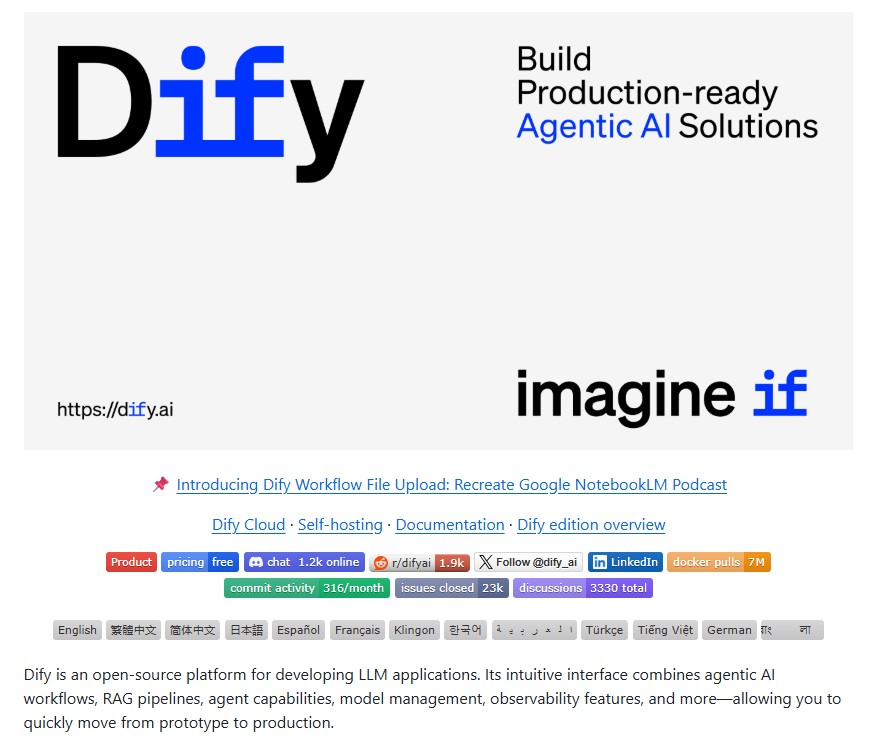The rapid growth of AI has made large language models (LLMs) an essential component for automation, content creation, data intelligence and workflow optimization. But moving AI concepts from prototype to production has traditionally required significant engineering effort, infrastructure planning and model-orchestration expertise. Dify changes that entirely.

Dify is an open-source platform designed to help developers, startups, and enterprises build scalable, production-ready AI applications with ease. With its visual workflow builder, agent capabilities, RAG pipeline and prompt development tools, Dify enables teams to build complex AI systems without needing to reinvent infrastructure. It supports both cloud and self-hosted deployment, giving users full control over data and model customization. Whether you want to create smart chatbots, workflow automation agents, knowledge assistants or AI-powered products, Dify provides the necessary building blocks in one unified environment.
This article explores the key capabilities of Dify, installation requirements, use cases, deployment methods and why it has quickly become one of the leading platforms for AI application development.
What Is Dify?
Dify is an open-source development platform for LLM-powered applications. It streamlines the process of designing, testing, deploying, and scaling agentic workflows using intuitive tools and an integrated development environment. Rather than stitching together independent model SDKs, vector databases, API systems and logging components, Dify provides a complete layer for rapid prototype-to-production deployment.
Its interface is designed to accommodate both technical and non-technical users. Developers can write custom logic and automation while product teams can visually orchestrate AI pipelines using drag-and-drop components. Dify supports a large variety of open-source and commercial LLMs and integrates easily with external tools, prompting models, and RAG systems.
Key Features of Dify
Workflow Builder
One of Dify’s standout features is its visual workflow canvas. Users can design multi-step AI automations and decision flows, connecting input blocks, model calls, retrieval modules and tool functions. This framework makes it easy to create AI pipelines such as research assistants, multi-step content processors and conversational agents capable of executing logic.
Extensive Model Support
Dify works with a wide range of LLMs and inference providers, including:
- GPT models
- Google Gemini
- Mistral models
- Meta Llama 3 models
- OpenAI-compatible models
- Local self-hosted models
This flexibility means organizations can switch between models without rewriting infrastructure. A centralized model management system makes it simple to assign models to specific apps and compare performance.
Prompt IDE
Dify includes a dedicated prompt development environment that supports:
- Side-by-side model comparison
- Prompt testing and improvement
- Optional speech synthesis for chat experiences
- Prompt versioning and refinement
This allows developers to iterate rapidly and deploy prompt-driven applications with precision.
Advanced RAG Capabilities
Retrieval Augmented Generation is essential for enterprise AI systems and Dify provides robust RAG support. Features include:
- Document ingestion for PDFs, PPT files and text sources
- Automatic text extraction and indexing
- Query-aware retrieval and embedding
- RAG components within workflow pipelines
These capabilities help create intelligent knowledge assistants, customer support bots and private enterprise search systems.
Agent Framework and Tools
Dify enables users to build autonomous agents that can use tools, search the web, retrieve data or execute logic. It supports both ReAct and function-calling methodologies. A library of over 50 built-in tools includes search engines, image generators, computational engines and custom API triggers.
Observability and LLMOps
Operational stability is essential for deployed AI applications. Dify includes monitoring and analytics features such as:
- Usage logs
- Model performance insights
- Message-level traceability
- Dataset management
- Continuous improvement loops
This makes it easier to refine systems over time based on real-world data.
Backend-as-a-Service
Every component in Dify includes corresponding APIs allowing teams to integrate AI features directly into web platforms, business logic systems or mobile applications without rebuilding infrastructure.
Deployment Options
Dify offers multiple installation and deployment methods. System requirements include at least a dual-core CPU and 4 GB RAM.
Docker Compose (Recommended)
The easiest way to deploy Dify locally is through Docker Compose:
cd dify cd docker cp .env.example .env docker compose up -d Once running, users can initialize setup at: http://localhost/install
Cloud Version
Dify also offers a cloud-hosted service with a free tier, providing full access to the platform without configuration. The cloud edition includes sandbox GPT-4 credits for new users.
Enterprise Deployment
Enterprises can deploy Dify with enhanced features via:
- AWS Marketplace AMI
- Kubernetes Helm charts
- Terraform automation for major cloud platforms
- AWS CDK
- Alibaba Cloud deployment templates
These options support scalability, role-based access and branding customization.
Who Should Use Dify?
Dify is ideal for:
- AI product builders and startups
- Enterprises deploying AI internally
- Teams developing automated agents and assistants
- Researchers and analysts building AI workflows
- Software engineers integrating AI into existing systems
- No-code users needing a visual AI builder
Its versatility makes it suitable for both experimentation and mission-critical production workloads.
Conclusion
Dify has emerged as one of the most comprehensive open-source platforms for building and scaling LLM applications. With support for agentic workflows, RAG pipelines, prompt engineering, observability and a powerful visual builder, it reduces development friction and accelerates AI innovation. Whether deployed in the cloud or self-hosted, Dify empowers users to build private, secure and efficient AI systems that are ready for real-world use. As organizations increasingly require flexible and reliable AI infrastructure, Dify delivers a production-grade solution that combines ease of use with advanced capabilities.
Follow us for cutting-edge updates in AI & explore the world of LLMs, deep learning, NLP and AI agents with us.
Related Reads
- LMCache: Accelerating LLM Inference With Next-Generation KV Cache Technology
- Chandra OCR: The Future of Document Understanding and Layout-Aware Text Extraction
- Pixeltable: The Future of Declarative Data Infrastructure for Multimodal AI Workloads
- Meilisearch: The Lightning-Fast, AI-Ready Search Engine for Modern Applications
- Kimi Linear: The Future of Efficient Attention in Large Language Models

2 thoughts on “Dify: A Powerful #1 Production-Ready Platform for Building Advanced LLM Applications”